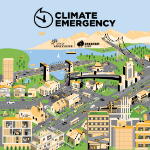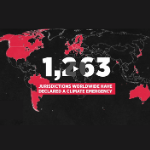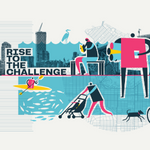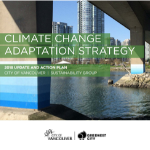
December 2023
IN THIS ISSUE
- Learn about progress made on Climate Emergency Action Plan
- Help restore a healthy Burrard inlet through a new interactive StoryMap
- Find new coastal tide gauges around Vancouver
- Get tips on navigating tricky climate conversations this holiday season
NOTEWORTHY
Are you interested in advising staff on ways to reduce carbon pollution from multi-family buildings, while making them more resilient to climate change and other environmental stressors? Apply by January 22, 2024 to be part of the new Climate-Friendly Buildings Advisory Committee. We encourage applicants of all backgrounds, ages, abilities and income levels to join this committee and share their experiences. Learn more here.

CLIMATE EMERGENCY ACTION PLAN | YEAR IN REVIEW
As another year ends, we would like to highlight recent progress towards our climate action target of a 50% reduction in carbon pollution by 2030.
Key achievements of 2023 include:
- Resilient retrofit pilots: Demonstrating the feasibility and benefits of resilient retrofitting, two pilot programs were launched in collaboration with partners to partially electrify up to 20 buildings in each pilot, focusing on providing tenants with cooling, improved air quality, and healthier and more comfortable non-profit housing and rental apartments.
- Active mobility plan: Creating the active mobility plan to guide the City’s investment in infrastructure and support safer and more comfortable options for walking, cycling and rolling to align with the City's active mobility targets.
- Missing middle: Adding multiplex housing to low-density areas to provide more housing choices across Vancouver, while enabling more residents to live closer to amenities, services and work.
- Parking minimums: Eliminating minimum parking requirements in new developments in the West End and Broadway Plan area, this policy reduces carbon emissions from concrete underground parking while decreasing costs for new projects, potentially leading to more affordable housing options.
- Leading by example: Reducing carbon pollution with innovative building design and electrifying our fleet is the focus of our green operations plan. As part of this work, Vancouver opened Canada’s first zero-carbon Passive House firehall and deployed Canada’s first electric fire engine.
New this year is our 2024 Climate Budget report, which was presented to Council on December 5 and unanimously approved on December 12. The Climate Budget is a decision-making tool to help prioritize the most impactful climate mitigation and adaptation projects for the City’s limited resources.
YOUR TURN
View the Climate Budget Council report and presentation.
On January 24, tune in as the Climate Emergency Action Plan annual report is presented to Council.
SUPPORTING: CLIMATE EMERGENCY, ADAPTATION

RESTORING A HEALTHY INLET STORYMAP
When rain falls on hard urban surfaces like roofs and streets, it picks up pollutants and transports them into pipes and streams flowing into waterways surrounding Vancouver - like səlilwət (Burrard Inlet). This toxic rainwater runoff harms wildlife, economic activities, our ability to swim and Indigenous practices.
City staff are proud to partner with səlilwətaɬ (Tsleil-Waututh Nation) on Restoring a Healthy Inlet, an interactive StoryMap that walks users through the history of the Inlet, shows sources of pollution and their impacts and offers actions that can be taken to reduce pollution from runoff and protect the Inlet.
Maintaining healthy and protected shorelines and streams supports our Climate Change Adaptation Strategy by helping to reduce the impacts of increased rain events and sea level rise.
This work also supports the City’s Healthy Waters Plan, a long-range sewage and rainwater management plan aimed at improving water quality in Vancouver’s receiving waters, which səlilwətaɬ are partners. The Healthy Waters Plan and this story map support defined reconciliation priorities under the City’s UNDRIP action plan, including restoring access to clean marine water and healthy food systems.
YOUR TURN
Visit the StoryMap to learn more about ways you can protect səlilwət, including:
- Using eco-friendly household products
- Disposing of hazardous waste properly
- Minimizing fertilizer use
- Picking up pet waste

NEW COASTAL TIDE GAUGES
Have you seen large ruler-like instruments mounted in various locations along Vancouver’s shoreline?
These newly installed instruments, also known as staff gauges, allow staff to measure coastal water levels. This provides useful readings during the winter when seasonal high tides, sometimes called King Tides, combine with storm surges to produce the highest coastal water levels of the year.
As sea levels rise due to climate change, the higher coastal water levels we experience a few days per year during the storm season will occur much more frequently. How our shorelines look during these storm events provides insight to how they may look more regularly in the future.
Through our Climate Change Adaptation Strategy, the City is preparing for sea level rise and other climate impacts to ensure a vibrant, livable and resilient future.
YOUR TURN
Keep your eyes peeled for these staff gauges. Can you find both of the new gauges?
Grab your camera during this winter’s King Tides between December 14 -19 and January 12 -17 and help us track how our shoreline is changing by submitting your photos of the shoreline to sealevelrise@vancouver.ca.
Read more about how Vancouver is preparing for sea level rise here.
SUPPORTING: ADAPTATION

NAVIGATING TRICKY CLIMATE CONVERSATIONS
This holiday season we may find ourselves at gatherings where opinions on climate change differ. These conversations can be challenging but are also a great way to practice respectful dialogue on important issues. A recent Climate Access webinar on Navigating Tricky Thanksgiving Climate Conversations provides some helpful tips for your own conversations this season.
- Avoid entering conversations with the intent to change minds – start by listening first and asking questions about their opinion. Learning what information or misinformation people have been exposed to can help us understand their values and where their thoughts and feelings come from.
- Bring your experiences to the conversation – talking about the impact of climate change using your own experiences makes it easier for others to relate and find common ground.
- Keep it local – because climate change is often perceived as something far away, focusing on local climate events is more salient and helps people understand why they should care.
YOUR TURN
Visit Climate Access for more resources.
Want to practice having productive conversations about climate change? David Suzuki Foundation has a simple chatbot called CliMate that allows you to run guided practice conversations and insights on the reaction your responses might elicit.
Watch Dr. Katharine Hayhoe explain her tips for talking to people who do not believe in climate change.
SUPPORTING: CLIMATE EMERGENCY

Community Ener-Tea Net Zero in Our Neighbourhood
December 15
Join Student Energy for an evening of tea, connections and dialogue about what net-zero means and what it could look like in Vancouver.
1318 Cartwright St
Get to know a trail: Sea Wall and Tea
December 16
Join Stanley Park Ecology Society to explore the joys of the trails across Stanley Park. Learn about the seawall’s construction and enjoy some warm tea on this quiet stroll.
Stanley Park Information Booth
Winter Ecocamp
January 2-5
Children ages 6-11 can join Stanley Park Ecology Society for this Winter Wildlife themed camp. Be immersed with nature and uncover the mysteries of the natural world, learn valuable outdoor skills and have a blast with other kids.
Stanley Park Pavilion
Recycle your Christmas tree
Various between January 4 - 21
Put your tree on the curb for a designated collection day or bring it to a chipping event. Make sure to remove all lights, tinsel or garland.
Various
Gardening Corner
January 10 – February 7
Are you interested in gardening and natural food preparation, but not sure where to start? Join this five-week series to learn about nutrition, plants, soil, seeds and insects through fun and engaging activities.
Hastings Community Centre
Moberly Community Garden Workshop
January 14
Join this workshop to learn gardening skills and stewardship for this important community food resource.
Moberly Lower Hall
Farmer’s Markets
Saturdays and Sundays
Riley Park and Hastings Park markets are open for winter! Visit their website to plan your visit and learn about the market’s local farmers, food producers and creators.
Various
Vancouver Food Rescue
Sundays
Join volunteers in Stanley Park or Mount Pleasant to pack food boxes or buy a box of delicious surplus produce and staples from local grocery stores that will otherwise go to the landfill. Boxes cater to dietary needs and help reduce Vancouver’s carbon pollution.
Various
Volunteer as a Snow Angel
Ongoing
Climate change means more frequent and intense extreme weather events. This winter, help seniors and people with limited mobility clear their sidewalks after a snowfall.
Various
Streetwise Cycling Online
Any time
New to cycling? This free educational series from HUB helps adult beginner riders gain knowledge and skills to start their cycling journey at their own pace with confidence.
Online
Connect and learn more
Vancouver.ca Twitter Facebook Talk Vancouver LinkedIn Instagram
City of Vancouver - 453 West 12th Avenue - Vancouver - BC - V5Y 1V4



